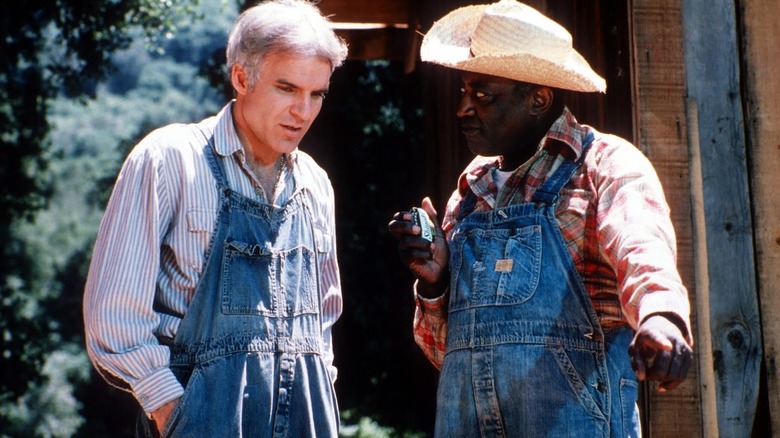Steve Martin Saved The Jerk's Script With A Single Sentence
In modern parlance, a jerk refers to a cruel, mean-spirited, or hateful person. In 2022, "jerk" is synonymous with "bully" or "a**hole." In 1979, however, when director Carl Reiner, Steve Martin, and screenwriters Carl Gottlieb and Michael Elias were making their comedy film "The Jerk," the word referred to a fool or a buffoon, someone who was clueless. Navin R. Johnson, Martin's character in "The Jerk," is most certainly clueless, seemingly unable to fully perceive the world around him. In a long tradition of well-meaning comedic fools, Navin sees the world as a glorious place, even as he encounters crime and horror. He is a modern-day Candide, fecklessly roaming the countryside, hastily discovering success and love, then just as quickly losing them through his own hubris and idiocy. In his book "Born Standing Up: A Comic's Life," Martin himself compared "The Jerk" to Dostoyevsky's novel "The Idiot."
It takes a very careful balance to play a character like Navin. He needs to be clueless to the point of insensitivity, and dumb enough for audiences to understand his inability to care for himself, but he also needs to be just likable enough for people to root for him. Not like him, necessarily, but root for him.
In a 2019 oral history of "The Jerk" published by Consequence, Gottlieb talked about how much workshopping his script required before it clicked into place. Evidently, there was an extended period when "The Jerk" didn't quite have an "entry point" for Martin or for audiences to gain ingress. After a great deal of time spitballing ideas with Elias and Reiner, Gottlieb revealed that it was Martin who finally provided them with their handle.
Navin's family
As it happened, when Martin was on stage performing standup comedy, he often had a single line in his back pocket that he would always use to win back an audience he found himself losing. That comedy "spare" was enough to get "The Jerk" rolling.
The opening of "The Jerk" finds Navin living at home with his adopted family, Black sharecroppers who felt they never had to explain the white Navin's adopted status to him. Navin is so imperceptive, however, that he assumes that he too has always been Black. Playing into jokes about racial stereotypes, Navin's family all have wonderful musical rhythm while Navin does not. It's not until he hears a bland, Lawrence Welk-ready version of "Crazy Rhythm" from the 1928 musical "Here's Howe" does he realize that he can indeed snap his fingers along to music. Bland, boring "white guy" music.
This entire introductory sequence was inspired entirely by Martin's "run dry" standup line. As Gottlieb tells it, the process was stymied until Martin save things. He begins:
"There was no idea. We sat there everyday. We had a nice little office in the writers building right on the Paramount lot with a couple new pencils and yellow pads and we'd go into work every morning and look at each other and say 'Well, what about...' And then a couple of weeks went by and we didn't have anything."
I was born ...
Gottlieb continued:
"And then Steve one day said, 'Y'know, there's a line in my act that always gets a laugh, even if the act isn't doing that well.' I said 'Well, what's the line?' He says 'I was born a poor Black child.' So, that landed in the room with significant impact. And we said, 'Wow. But what if you were? What would that be like? Steve Martin as a poor Black child?'"
The central gag was blunt but was considered quite hilarious. It also gave Navin an arc, allowing the tale to blossom into the full-bore "Candide" riff that it was. Navin was seen at home, getting sage advice from his father (Richard Ward from "Across 110th Street" and "Mary Hartman, Mary Hartman") and affection from his mom (Mabel King from "What's Happening!" and "The Wiz"). Upon hearing horribly bland lounge music, he finds that he needs to leave home and experience the world. His family knows that he is likely doomed, but let him live his dreams. The story then follows Navin to an inglorious job at a gas station, into the arms of the staggeringly tolerant Bernadette Peters, and into untold wealth after his invention of a nose clip that holds one's glasses onto faces.
By the end of the film, Navin has lost everything and is living on the street. "I have two things. My friends, and my thermos." It will be Ward and King who find him destitute, and who take him home. It turns out, they were wise investors and were able to build a large home for themselves. This is, as Voltaire would say, the best of all possible worlds.


